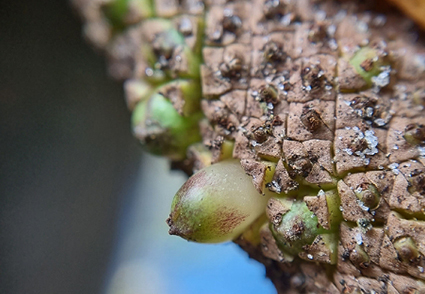Abstract
Anthurium argyrophyllum, a new species from the Atlantic Forest is described, illustrated and its morphological affinities with other species are discussed. This species is only known from cocoa agroforests in Southern Bahia State, Brazil.
References
- Barroso, G.M. (1957) Araceae Novae. Arquivos do Jardim Botânico do Rio de Janeiro 15: 89–112.
- Barroso, G.M. (1970) Espécies novas de Anthurium Schott. Loefgrenia 46: 1–4.
- Beentje, H. (2016) The Kew Plant Glossary: an illustrated dictionary of plant terms. Royal Botanic Gardens, Kew, 184 pp.
- BFG. (2022) Brazilian Flora 2020: Leveraging the power of a collaborative scientific network. Taxon 71: 178–198.
- Bogner, J. & Gonçalves, E.G. (2002) Two new aroids from South America. Willdenowia 32: 323–329. https://doi.org/10.3372/wi.32.32214
- Brandão, H.C.R.S., Moraes, C.A.C., Silva, A.P., Gonçalves Júnior, J.F., de Souza, R.R. & da Silva, D.M.L. (2022) Litter inputs and standing stocks in riparian zones and streams under secondary forest and managed and abandoned cocoa agroforestry systems. PeerJ 10: e13787. https://doi.org/10.7717/peerj.13787
- Carlsen, M. & Croat, T.B. (2013) A Molecular Phylogeny of the Species-Rich Neotropical Genus Anthurium (Araceae) Based on Combined Chloroplast and Nuclear DNA. Systematic Botany 38: 576–588. https://doi.org/10.1600/036364413X670287
- Caramaschi, U. & Rodrigues, M.T. (2003) A new large treefrog species, genus Hyla Laurenti, 1768, from southern Bahia, Brazil (Amphibia, Anura, Hylidae). Arquivos do Museu Nacional 61: 255–260.
- Coelho, M.A.N. (2010) Espécies novas de Anthurium e Philodendron (Araceae) do sudeste brasileiro. Boletim do Museu de Biologia Mello Leitão 28: 21–40.
- Coelho, M.A.N. & Valadares, R.T. (2019) Three new species of Anthurium (Araceae) from the Atlantic Forest of Rio de Janeiro, Minas Gerais, and Espírito Santo, Brazil. Novon 27: 22–32. https://doi.org/10.3417/2019267
- Croat, T.B. & Bunting, G.S. (1979) Standardization of Anthurium descriptions. Aroideana 2: 15–25.
- Croat, T.B. (1980) Flowering behavior of the neotropical genus Anthurium (Araceae). American Journal of Botany 67: 888–904. https://doi.org/10.2307/2442430
- Ellis, B., Daly, D.C., Hickey, L.J., Johnson, K.R., Mitchell, J.D., Wilf, P. & Wing, S.L. (2009) Manual of Leaf Architecture. Cornell University Press, New York, 220 pp. https://doi.org/10.1079/9781845935849.0000
- Flora e Funga do Brasil (2023) Jardim Botânico do Rio de Janeiro. Available from: http://floradobrasil.jbrj.gov.br/ (accessed: 25 October 2023).
- Goldenberg, R. & Amorim, A.M. (2006) Physeterostemon (Melastomataceae): a new genus and two new species from the Bahian Atlantic Forest, Brazil. Taxon 55: 965–972. https://doi.org/10.2307/25065690
- Goldenberg, R., Michelangeli, F.A., Aona, L.Y.S. & Amorim, A.M. (2016) Angiosperms and the Linnean shortfall: three new species from three lineages of Melastomataceae at one spot at the Atlantic Forest. PeerJ 4: e1824. https://doi.org/10.7717/peerj.1824
- Gonçalves, E.G. & Jardim, J.G. (2009) Two new species of Anthurium (Araceae) from Serra do Teimoso, Bahia, Brazil. Kew Bulletin 64: 713–717. https://doi.org/10.1007/s12225-009-9146-y
- Gonçalves, E.G. (2011) Philodendron bernardopazii and P. ricardoi spp. nov. (Araceae) from Espírito Santo State, Brazil. Nordic Journal of Botany 29: 385–390. https://doi.org/10.1111/j.1756-1051.2011.01103.x
- IBGE (2012) Manual Técnico da Vegetação Brasileira: Sistema fitogeográfico, Inventário das formações florestais e campestres, Técnicas e manejo de coleções botânicas e Procedimentos para mapeamentos. IBGE, Rio de Janeiro, 272 pp.
- IUCN (2012) IUCN Red List Categories and Criteria, Version 3.1. IUCN Species Survival Commission, IUCN, Gland, Switzerland, Cambridge, United Kingdom, 32 pp.
- Jordy Filho, A. (1987) Vegetação: as regiões fitoecológicas, sua natureza e seus recursos econômicos. Estudo fitogeográfico. In: IBGE. Folha SE. 24 Rio Doce: geologia, geomorfologia, pedologia, vegetação e uso potencial da terra. Fundação Instituto Brasileiro de Geografia e Estatística, Rio de Janeiro, pp. 553–624.
- Koch, K. (1855) Aroideae novae et criticae. Index seminum in Horto Botanico Berolinensi 1855: 2–8.
- Kunth, C.S. (1841) Enumeratio Plantarum Omnium hucusque Cognitarum 3. Sumtibus J. g. Cottae, Stutgardiae and Tubingae, 644 pp.
- Leitman, P.M., Amorim, A.M., Sansevero, J.B.B. & Forzza, R.C. (2015) Floristic patterns of the epiphytes in the Brazilian Atlantic Forest, a biodiversity hotspot. Botanical Journal of Linnaean Society 179: 587–601. https://doi.org/10.1111/boj.12342
- Leme, E.M.C., Ribeiro, O.B.C., Souza, F.V., Souza, E.H., Kollmann, L.J.C. & Fontana, A.P. (2020) Miscellaneous new species in the “Cryptanthoid complex” (Bromeliaceae: Bromelioideae) from Eastern Brazil. Phytotaxa 430: 157–202. https://doi.org/10.11646/phytotaxa.430.3.2
- Leme, E.M.C., Souza, E.H.de, Aona-Pinheiro, L.Y.S. & Souza, F.V. (2023) Two new Wittmackia species (Bromeliaceae: Bromelioideae) from Bahia, Brazil. Phytotaxa 583: 241–250. https://doi.org/10.11646/phytotaxa.583.3.2
- Machado, G.B. (2019) Agricultura produtivista à agricultura multifuncional no sistema agrário do cacau. Brazilian Journal of Development 5: 13868–13890. https://doi.org/10.34117/bjdv5n9-017
- Menini Neto, L., Furtado, S.G., Zappi, D.C., Oliveira Filho, A.T. & Forzza, R.C. (2016) Biogeography of epiphytic Angiosperms in the Brazilian Atlantic forest, a world biodiversity hotspot. Brazilian Journal of Botany 39: 261–273. https://doi.org/10.1007/s40415-015-0238-7
- Noblick, L.R. & Lorenzi, H. (2010) Lytocaryum, Including a New Species from Bahia, Brazil. Palms 54: 5–17.
- Oliveira Filho, A.T. & Fontes, M.A.L. (2000) Patterns of floristic differentiation among Atlantic Forests in Southeastern Brazil and the influence of climate. Biotropica 32: 793–810. https://doi.org/10.1111/j.1744-7429.2000.tb00619.x
- Schott, H.W. (1829) Für Liebhaber der Botanik. Wiener Zeitschrift für Kunst, Litteratur, Theater und Mode 3: 828.
- Schott, H.W. (1860) Prodromus Systematis Aroidearum. Typis Congregationis Mechitheristicae, Vindobae, 602 pp.
- Soares, K.P., Pimenta, R.S. & Guimarães, C.A. (2013) Duas novas espécies de Syagrus Mart. (Arecaceae) para o Brasil. Ciência Florestal 23: 417–426. https://doi.org/10.5902/1980509810553
- Souza, E.H. & Leme, E.M.C. (2021) New Cryptanthus species (Bromeliaceae: Bromelioideae) from the State of Bahia, Brazil. Phytotaxa 523: 179–191. https://doi.org/10.11646/phytotaxa.523.2.5
- Sweet, R. & Don, G. (1839) Sweet’s Hortus Britannicus; Or, a Catalogue of Plants Cultivated in the Gardens of Great Britain Arranged in Natural Orders, Etc. J. Ridgway, London, 799 pp.
- Temponi, L.G. (2006) Sistemática de Anthurium sect. Urospadix (Araceae). Ph.D. Thesis, Instituto de Biociencias, Universidade de São Paulo, São Paulo. https://doi.org/10.11606/T.41.2007.tde-21082007-143011
- Valadares, R.T. & Sakuragui, C.M. (2015) A new species of Anthurium Schott (Araceae) in a seasonal semideciduous forest in Espírito Santo State, Brazil. Phytotaxa 217: 80–86. https://doi.org/10.11646/phytotaxa.217.1.7
- Valadares, R.T., Kollmann, L.J.C. & Sakuragui, C.M. (2019) New species of Anthurium (Araceae) with cordate leaves from Southeastern Brazil. Novon 27: 3–7. https://doi.org/10.3417/2018270
- Valadares, R.T., Sagrillo, T.F. & Sakuragui, C.M. (2020) Anthurium sagrilloanum: a new species of Anthurium (Araceae) from Southeastern Brazil. Novon 28: 60–63. https://doi.org/10.3417/2019424


